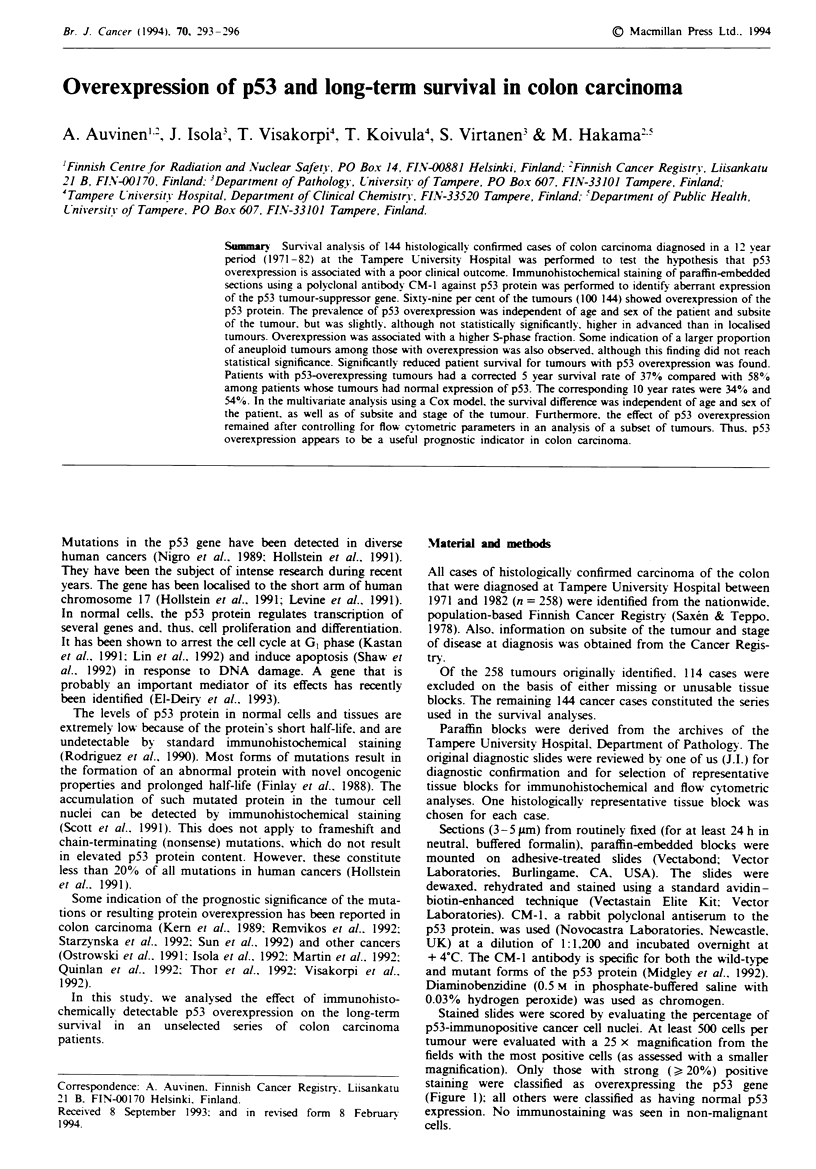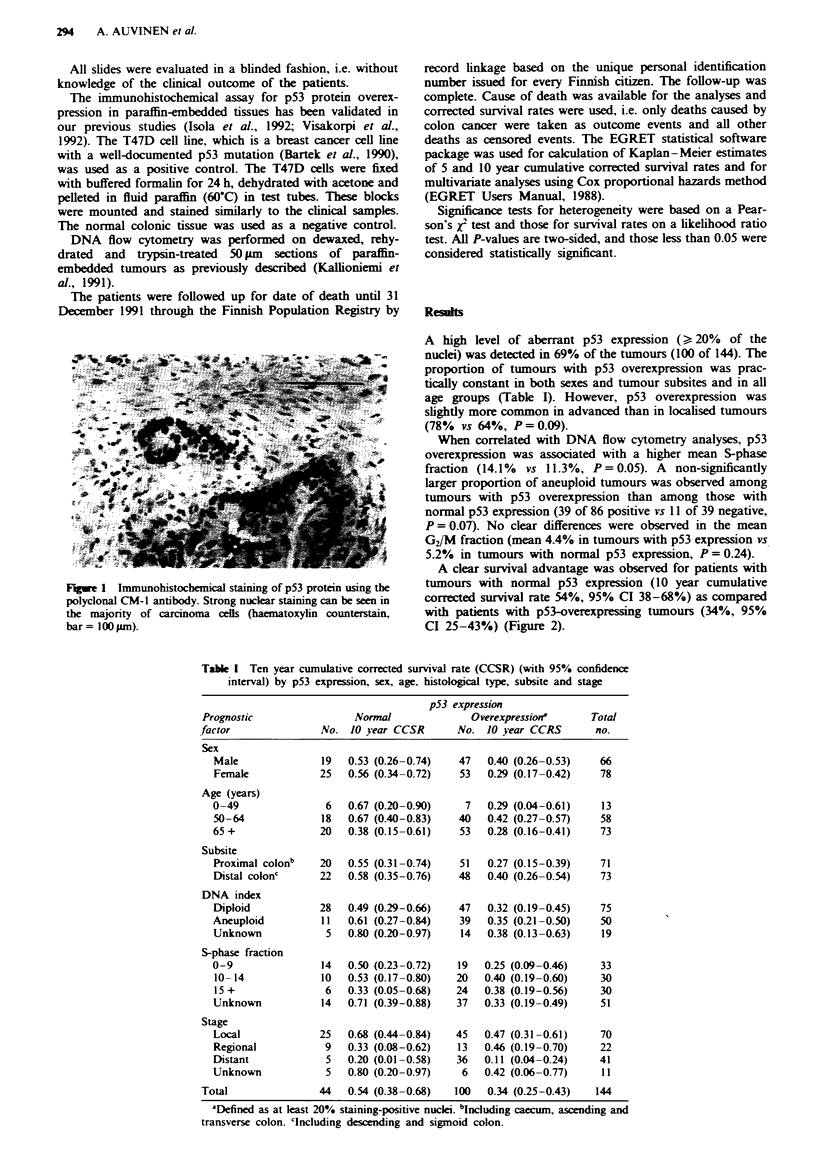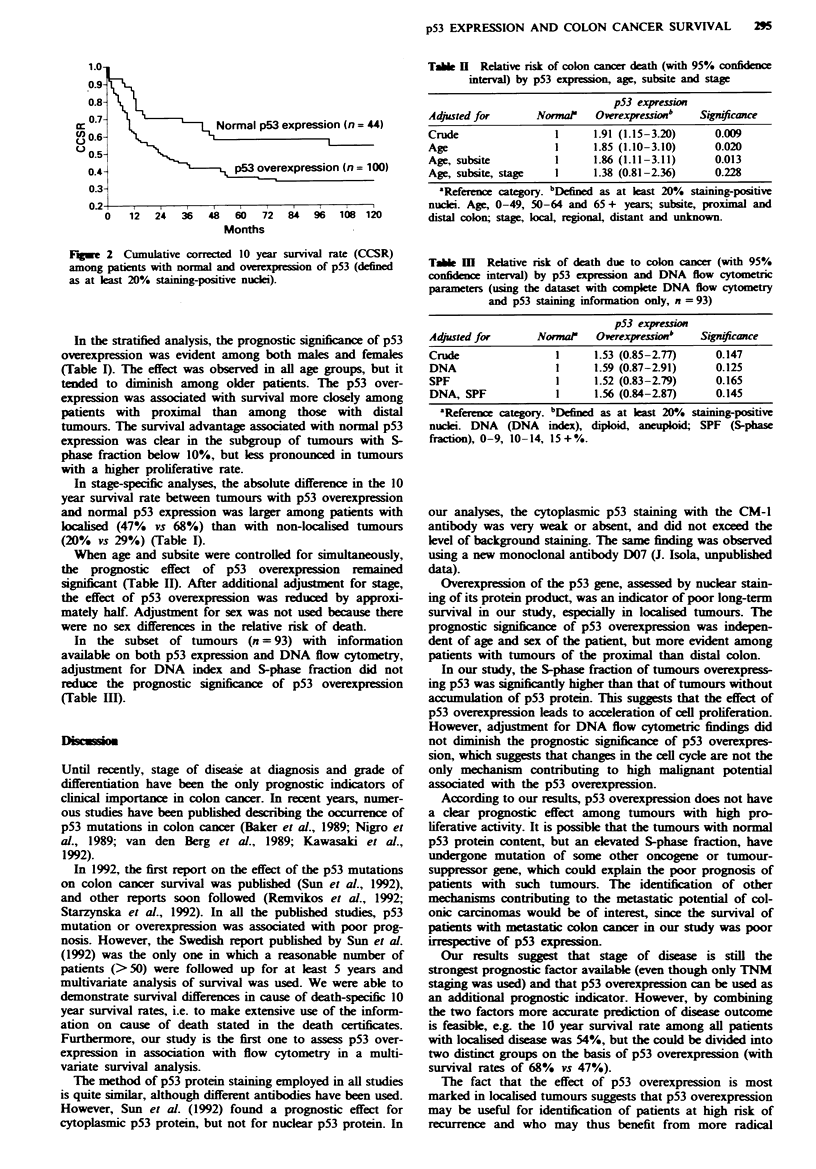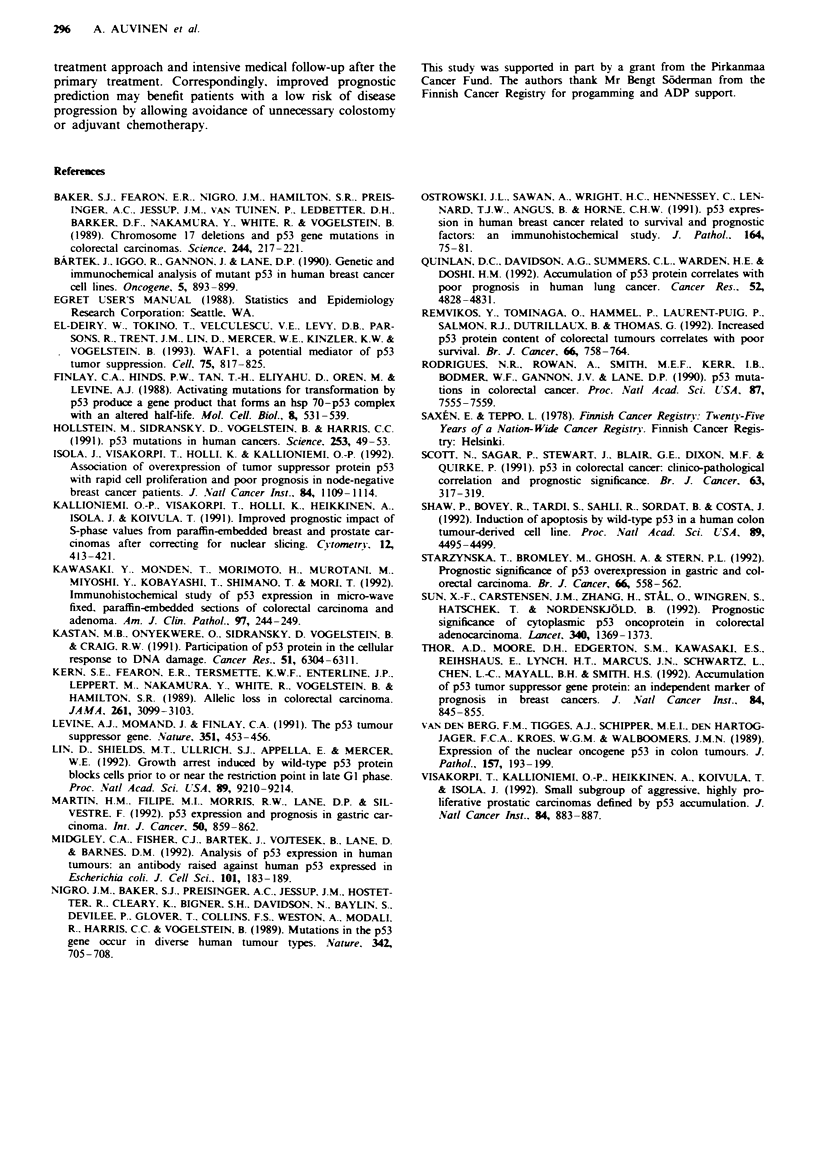Abstract
Survival analysis of 144 histologically confirmed cases of colon carcinoma diagnosed in a 12 year period (1971-82) at the Tampere University Hospital was performed to test the hypothesis that p53 overexpression is associated with a poor clinical outcome. Immunohistochemical staining of paraffin-embedded sections using a polyclonal antibody CM-1 against p53 protein was performed to identify aberrant expression of the p53 tumour-suppressor gene. Sixty-nine per cent of the tumours (100/144) showed overexpression of the p53 protein. The prevalence of p53 overexpression was independent of age and sex of the patient and subsite of the tumour, but was slightly, although not statistically significantly, higher in advanced than in localised tumours. Overexpression was associated with a higher S-phase fraction. Some indication of a larger proportion of aneuploid tumours among those with overexpression was also observed, although this finding did not reach statistical significance. Significantly reduced patient survival for tumours with p53 overexpression was found. Patients with p53-overexpressing tumours had a corrected 5 year survival rate of 37% compared with 58% among patients whose tumours had normal expression of p53. The corresponding 10 year rates were 34% and 54%. In the multivariate analysis using a Cox model, the survival difference was independent of age and sex of the patient, as well as of subsite and stage of the tumour. Furthermore, the effect of p53 overexpression remained after controlling for flow cytometric parameters in an analysis of a subset of tumours. Thus, p53 overexpression appears to be a useful prognostic indicator in colon carcinoma.
Full text
PDF



Images in this article
Selected References
These references are in PubMed. This may not be the complete list of references from this article.
- Baker S. J., Fearon E. R., Nigro J. M., Hamilton S. R., Preisinger A. C., Jessup J. M., vanTuinen P., Ledbetter D. H., Barker D. F., Nakamura Y. Chromosome 17 deletions and p53 gene mutations in colorectal carcinomas. Science. 1989 Apr 14;244(4901):217–221. doi: 10.1126/science.2649981. [DOI] [PubMed] [Google Scholar]
- Bartek J., Iggo R., Gannon J., Lane D. P. Genetic and immunochemical analysis of mutant p53 in human breast cancer cell lines. Oncogene. 1990 Jun;5(6):893–899. [PubMed] [Google Scholar]
- Finlay C. A., Hinds P. W., Tan T. H., Eliyahu D., Oren M., Levine A. J. Activating mutations for transformation by p53 produce a gene product that forms an hsc70-p53 complex with an altered half-life. Mol Cell Biol. 1988 Feb;8(2):531–539. doi: 10.1128/mcb.8.2.531. [DOI] [PMC free article] [PubMed] [Google Scholar]
- Hollstein M., Sidransky D., Vogelstein B., Harris C. C. p53 mutations in human cancers. Science. 1991 Jul 5;253(5015):49–53. doi: 10.1126/science.1905840. [DOI] [PubMed] [Google Scholar]
- Isola J., Visakorpi T., Holli K., Kallioniemi O. P. Association of overexpression of tumor suppressor protein p53 with rapid cell proliferation and poor prognosis in node-negative breast cancer patients. J Natl Cancer Inst. 1992 Jul 15;84(14):1109–1114. doi: 10.1093/jnci/84.14.1109. [DOI] [PubMed] [Google Scholar]
- Kallioniemi O. P., Visakorpi T., Holli K., Heikkinen A., Isola J., Koivula T. Improved prognostic impact of S-phase values from paraffin-embedded breast and prostate carcinomas after correcting for nuclear slicing. Cytometry. 1991;12(5):413–421. doi: 10.1002/cyto.990120506. [DOI] [PubMed] [Google Scholar]
- Kastan M. B., Onyekwere O., Sidransky D., Vogelstein B., Craig R. W. Participation of p53 protein in the cellular response to DNA damage. Cancer Res. 1991 Dec 1;51(23 Pt 1):6304–6311. [PubMed] [Google Scholar]
- Kawasaki Y., Monden T., Morimoto H., Murotani M., Miyoshi Y., Kobayashi T., Shimano T., Mori T. Immunohistochemical study of p53 expression in microwave-fixed, paraffin-embedded sections of colorectal carcinoma and adenoma. Am J Clin Pathol. 1992 Feb;97(2):244–249. doi: 10.1093/ajcp/97.2.244. [DOI] [PubMed] [Google Scholar]
- Kern S. E., Fearon E. R., Tersmette K. W., Enterline J. P., Leppert M., Nakamura Y., White R., Vogelstein B., Hamilton S. R. Clinical and pathological associations with allelic loss in colorectal carcinoma [corrected]. JAMA. 1989 Jun 2;261(21):3099–3103. doi: 10.1001/jama.261.21.3099. [DOI] [PubMed] [Google Scholar]
- Levine A. J., Momand J., Finlay C. A. The p53 tumour suppressor gene. Nature. 1991 Jun 6;351(6326):453–456. doi: 10.1038/351453a0. [DOI] [PubMed] [Google Scholar]
- Lin D., Shields M. T., Ullrich S. J., Appella E., Mercer W. E. Growth arrest induced by wild-type p53 protein blocks cells prior to or near the restriction point in late G1 phase. Proc Natl Acad Sci U S A. 1992 Oct 1;89(19):9210–9214. doi: 10.1073/pnas.89.19.9210. [DOI] [PMC free article] [PubMed] [Google Scholar]
- Martin H. M., Filipe M. I., Morris R. W., Lane D. P., Silvestre F. p53 expression and prognosis in gastric carcinoma. Int J Cancer. 1992 Apr 1;50(6):859–862. doi: 10.1002/ijc.2910500604. [DOI] [PubMed] [Google Scholar]
- Midgley C. A., Fisher C. J., Bártek J., Vojtesek B., Lane D., Barnes D. M. Analysis of p53 expression in human tumours: an antibody raised against human p53 expressed in Escherichia coli. J Cell Sci. 1992 Jan;101(Pt 1):183–189. doi: 10.1242/jcs.101.1.183. [DOI] [PubMed] [Google Scholar]
- Nigro J. M., Baker S. J., Preisinger A. C., Jessup J. M., Hostetter R., Cleary K., Bigner S. H., Davidson N., Baylin S., Devilee P. Mutations in the p53 gene occur in diverse human tumour types. Nature. 1989 Dec 7;342(6250):705–708. doi: 10.1038/342705a0. [DOI] [PubMed] [Google Scholar]
- Ostrowski J. L., Sawan A., Henry L., Wright C., Henry J. A., Hennessy C., Lennard T. J., Angus B., Horne C. H. p53 expression in human breast cancer related to survival and prognostic factors: an immunohistochemical study. J Pathol. 1991 May;164(1):75–81. doi: 10.1002/path.1711640113. [DOI] [PubMed] [Google Scholar]
- Quinlan D. C., Davidson A. G., Summers C. L., Warden H. E., Doshi H. M. Accumulation of p53 protein correlates with a poor prognosis in human lung cancer. Cancer Res. 1992 Sep 1;52(17):4828–4831. [PubMed] [Google Scholar]
- Remvikos Y., Tominaga O., Hammel P., Laurent-Puig P., Salmon R. J., Dutrillaux B., Thomas G. Increased p53 protein content of colorectal tumours correlates with poor survival. Br J Cancer. 1992 Oct;66(4):758–764. doi: 10.1038/bjc.1992.352. [DOI] [PMC free article] [PubMed] [Google Scholar]
- Rodrigues N. R., Rowan A., Smith M. E., Kerr I. B., Bodmer W. F., Gannon J. V., Lane D. P. p53 mutations in colorectal cancer. Proc Natl Acad Sci U S A. 1990 Oct;87(19):7555–7559. doi: 10.1073/pnas.87.19.7555. [DOI] [PMC free article] [PubMed] [Google Scholar]
- Scott N., Sagar P., Stewart J., Blair G. E., Dixon M. F., Quirke P. p53 in colorectal cancer: clinicopathological correlation and prognostic significance. Br J Cancer. 1991 Feb;63(2):317–319. doi: 10.1038/bjc.1991.74. [DOI] [PMC free article] [PubMed] [Google Scholar]
- Shaw P., Bovey R., Tardy S., Sahli R., Sordat B., Costa J. Induction of apoptosis by wild-type p53 in a human colon tumor-derived cell line. Proc Natl Acad Sci U S A. 1992 May 15;89(10):4495–4499. doi: 10.1073/pnas.89.10.4495. [DOI] [PMC free article] [PubMed] [Google Scholar]
- Starzynska T., Bromley M., Ghosh A., Stern P. L. Prognostic significance of p53 overexpression in gastric and colorectal carcinoma. Br J Cancer. 1992 Sep;66(3):558–562. doi: 10.1038/bjc.1992.314. [DOI] [PMC free article] [PubMed] [Google Scholar]
- Sun X. F., Carstensen J. M., Zhang H., Stål O., Wingren S., Hatschek T., Nordenskjöld B. Prognostic significance of cytoplasmic p53 oncoprotein in colorectal adenocarcinoma. Lancet. 1992 Dec 5;340(8832):1369–1373. doi: 10.1016/0140-6736(92)92558-w. [DOI] [PubMed] [Google Scholar]
- Thor A. D., Moore DH I. I., Edgerton S. M., Kawasaki E. S., Reihsaus E., Lynch H. T., Marcus J. N., Schwartz L., Chen L. C., Mayall B. H. Accumulation of p53 tumor suppressor gene protein: an independent marker of prognosis in breast cancers. J Natl Cancer Inst. 1992 Jun 3;84(11):845–855. doi: 10.1093/jnci/84.11.845. [DOI] [PubMed] [Google Scholar]
- Visakorpi T., Kallioniemi O. P., Heikkinen A., Koivula T., Isola J. Small subgroup of aggressive, highly proliferative prostatic carcinomas defined by p53 accumulation. J Natl Cancer Inst. 1992 Jun 3;84(11):883–887. doi: 10.1093/jnci/84.11.883. [DOI] [PubMed] [Google Scholar]
- el-Deiry W. S., Tokino T., Velculescu V. E., Levy D. B., Parsons R., Trent J. M., Lin D., Mercer W. E., Kinzler K. W., Vogelstein B. WAF1, a potential mediator of p53 tumor suppression. Cell. 1993 Nov 19;75(4):817–825. doi: 10.1016/0092-8674(93)90500-p. [DOI] [PubMed] [Google Scholar]
- van den Berg F. M., Tigges A. J., Schipper M. E., den Hartog-Jager F. C., Kroes W. G., Walboomers J. M. Expression of the nuclear oncogene p53 in colon tumours. J Pathol. 1989 Mar;157(3):193–199. doi: 10.1002/path.1711570304. [DOI] [PubMed] [Google Scholar]



